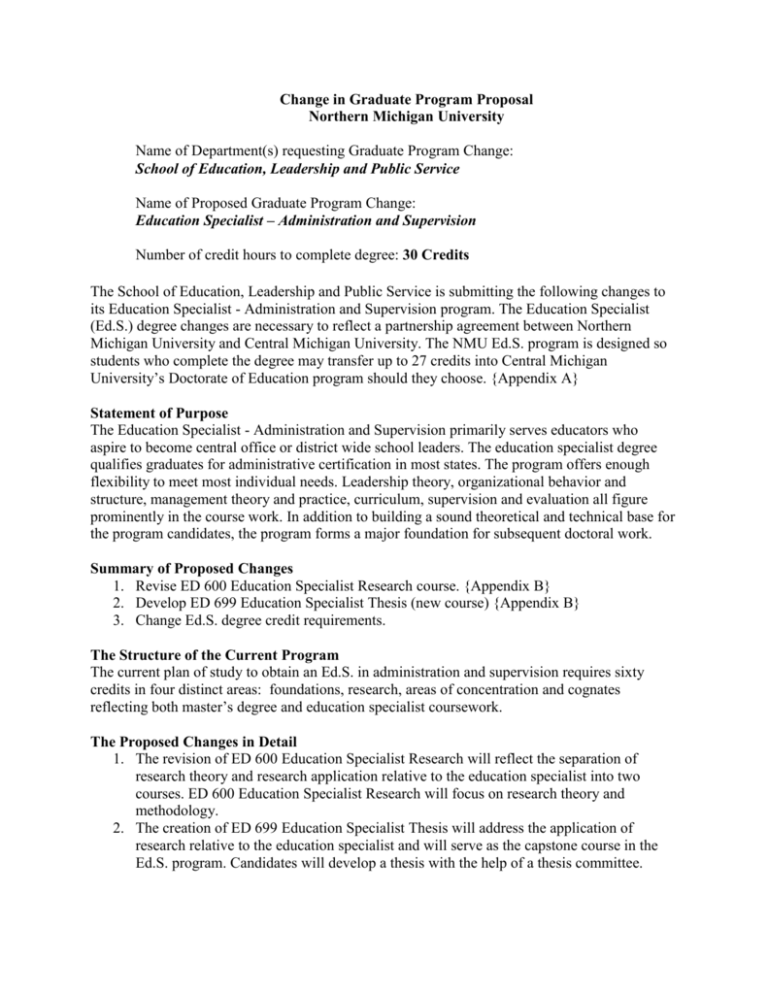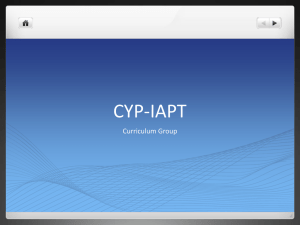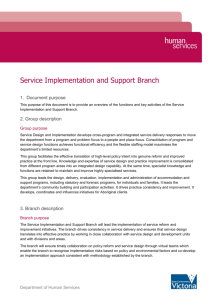EdS GPC Program Revision Fall 2014
advertisement

Change in Graduate Program Proposal
Northern Michigan University
Name of Department(s) requesting Graduate Program Change:
School of Education, Leadership and Public Service
Name of Proposed Graduate Program Change:
Education Specialist – Administration and Supervision
Number of credit hours to complete degree: 30 Credits
The School of Education, Leadership and Public Service is submitting the following changes to
its Education Specialist - Administration and Supervision program. The Education Specialist
(Ed.S.) degree changes are necessary to reflect a partnership agreement between Northern
Michigan University and Central Michigan University. The NMU Ed.S. program is designed so
students who complete the degree may transfer up to 27 credits into Central Michigan
University’s Doctorate of Education program should they choose. {Appendix A}
Statement of Purpose
The Education Specialist - Administration and Supervision primarily serves educators who
aspire to become central office or district wide school leaders. The education specialist degree
qualifies graduates for administrative certification in most states. The program offers enough
flexibility to meet most individual needs. Leadership theory, organizational behavior and
structure, management theory and practice, curriculum, supervision and evaluation all figure
prominently in the course work. In addition to building a sound theoretical and technical base for
the program candidates, the program forms a major foundation for subsequent doctoral work.
Summary of Proposed Changes
1. Revise ED 600 Education Specialist Research course. {Appendix B}
2. Develop ED 699 Education Specialist Thesis (new course) {Appendix B}
3. Change Ed.S. degree credit requirements.
The Structure of the Current Program
The current plan of study to obtain an Ed.S. in administration and supervision requires sixty
credits in four distinct areas: foundations, research, areas of concentration and cognates
reflecting both master’s degree and education specialist coursework.
The Proposed Changes in Detail
1. The revision of ED 600 Education Specialist Research will reflect the separation of
research theory and research application relative to the education specialist into two
courses. ED 600 Education Specialist Research will focus on research theory and
methodology.
2. The creation of ED 699 Education Specialist Thesis will address the application of
research relative to the education specialist and will serve as the capstone course in the
Ed.S. program. Candidates will develop a thesis with the help of a thesis committee.
Issues related to educational programs are identified, selected and investigated, resulting
in a thesis for completion of an education specialist degree.
3. The current program requires candidates to transfer thirty credits from the completed
master’s degree into the required sixty credits for the Ed.S. The proposed change is to
request confirmation of a conferred master’s degree through the submission of transcripts
during the application phase.
Graduate Bulletin
The Education Specialist - Administration and Supervision primarily serves educators who
aspire to become central office or district wide school leaders. The Ed.S. serves educators who
wish to advance beyond the master’s of arts degree. The degree plan requires the completion of
30 credits beyond a master’s degree from an accredited graduate institution. Ed.S. completion is
defined as completion of all coursework and the thesis. Students wishing to obtain a central
office certification must complete an application to the Michigan Department of Education.
The education specialist degree qualifies graduates for administrative certification in most states.
The program offers enough flexibility to meet most individual needs. Leadership theory,
organizational behavior and structure, management theory and practice, curriculum, supervision
and evaluation all figure prominently in the course work. In addition to building a sound
theoretical and technical base for the practicing administrators, the program forms a major
foundation for subsequent doctoral work.
The NMU Ed.S. is delivered through a cohort model. The program is designed so students who
complete the degree may transfer up to 27 credits into Central Michigan University’s doctor of
education degree (Ed.D.) program. Students admitted to the NMU Ed.S. program are not
guaranteed admission into CMU’s Ed.D. program.
For department information or additional degree requirements, click here.
For course description, click on the course.
Total Credits Beyond a Master’s Degree Required for Ed.S. Degree
30
Research
6
ED 600 Education Specialist Research
3
ED 699 Education Specialist Thesis
3
Area of Concentration
ED 621 Curriculum Evaluation
ED 630 Advanced Educational Leadership
24
3
ED 640 School Policy and Governance
3
ED 644 Current Issues in School Law
3
ED 648 Administrative Internship
3
ED 650 The Superintendency
3
PY 554 Adult Learner
3
PY 558 Measuring and Evaluating Training
3
Admission Requirements
Ed.S. degree seeking students should apply for the Education Specialist program at NMU by
visiting http://www.nmu.edu/graduatestudies/node/26
Submit a current resume or vita to ncarter@nmu.edu
Submit a written 500 word response to each of the following questions to
ncarter@nmu.edu
o What are your goals as they relate to obtaining the NMU Education
Specialist with the possibility of applying and completing the Doctorate in
Education at Central Michigan University?
o What experiences and skills do you possess that will contribute to your
success in the Education Specialist program?
Please save the resume/vita, the answer to question 1 and the answer to question 2
as one Word document. Please use your name in the file name. So, if I was
submitting I would save the document as “Joe_Wellington_EdS_Application”.
Submit transcripts to show completion of a master’s degree unless the master’s
degree is from NMU
Applications previously enrolled in a master’s program or master’s level courses
at NMU do not have to pay the $50 application fee.
Upon admission to a graduate program, the School of Education, Leadership and Public Service
assigns the graduate student to an academic adviser. The academic adviser will advise the
student regarding courses and degree requirements for the graduate program to which he/she has
applied. The adviser must approve courses prior to enrollment.
Graduation Requirements
Students would need to complete 30 credit hours as approved by their adviser and all other
requirements established by the Department of Graduate Education and Research as outlined in
the Graduate Bulletin.
Revised and New Course Proposals
All revised and new course proposals are attached in Appendix B.
Projected Enrollments
Cohort One- 15 to 20 Students
Cohort Two- 15 to 20 Students
Anticipated Costs
None. The proposed curriculum will include instructors and professors from the previous
curriculum. No additional instructors will be necessary at this time.
Effect on Other Schools or Departments
1. Explain how the changes will affect the curriculum of the department, school, college, and
university.
a. Effect on other schools or departments through duplication of content, allocation of
necessary material, prerequisites, etc.
PY 554 and PY 558 are required program courses which are offered by the
Psychology department. We have received support from the Psychology department.
See attached letter.
Required Equipment
No additional specialized equipment needed.
Anticipated Library Usage
The current Olson Library holdings and on-line resources are more than adequate for this
program.
Space Requirements
The current space available including distance education technology, physical classroom space in
Whitman Hall, and the EduCat platform is sufficient for offering this program.
Program Delivery
The program will be offered fall, winter, and summer semesters.
Program Delivery Format
The courses will be taught as hybrid. This will allow candidates to collaborate in person and
online.
Planned Implementation Date
The program will officially start winter 2015.
Program Bulletin Changes
Degree or Program Details
Education Specialist - Administration and Supervision
Program Requirements
The education specialist degree (Ed.S.) in administration and supervision primarily serves
educators who aspire to become central office or district wide school leaders. school
superintendents, curriculum directors, or directors of special education. The Ed.S. It also serves
educators who wish to advance beyond the master of arts degree. The degree plan requires the
completion of 30 credits beyond a master’s degree from an accredited graduate institution. Ed.S.
completion is defined as completion of all coursework and the thesis. Students wishing to obtain
a central office certification must complete an application to the Michigan Department of
Education for the central office certificate.
The education specialist degree qualifies graduates for administrative certification in most states.
The program offers enough flexibility to meet most individual needs. Leadership theory,
organizational behavior and structure, management theory and practice, curriculum, supervision
and evaluation all figure prominently in the course work. In addition to building a sound
theoretical and technical base for the practicing administrators, the program forms a major
foundation for subsequent doctoral work.
The NMU Ed.S. is delivered through a cohort model. The program is designed so students who
complete the degree may transfer up to 27 credits into Central Michigan University’s doctor of
education degree (Ed.D.) program. Students admitted to the NMU Ed.S. program are not
guaranteed admission into CMU’s Ed.D. program.
For department information or additional degree requirements, click here.
For course description, click on the course.
Total Credits Required for Degree 60
6-8
Foundations
The foundations requirement includes elective courses in research techniques, evaluations and
measurement, and the cultural, historical, philosophical, sociological and psychological aspects
of education.
Research 4-6
ED 600 Education Specialist Research
2-8
(This study includes a written report of the planned field study, or research project)
Area of Concentration 24-36
Within the area of concentration, programs may be pursued with an emphasis in elementary,
secondary, general administration or in special support areas.
Cognates
12-16
Cognates shall be selected from the behavioral sciences and other areas to broaden perception of
the administrative function.
Electives
To complete candidate's approved program.
Total Credits Beyond a Master’s Degree Required for Ed.S. Degree
30
Research
6
ED 600 Education Specialist Research
3
ED 699 Thesis
3
Area of Concentration
ED 621 Curriculum Evaluation
24
3
ED 630 Advanced Educational Leadership
3
ED 640 School Policy and Governance
3
ED 644 Current Issues in School Law
3
ED 648 Administrative Internship
3
ED 650 The Superintendency
3
PY 554 Adult Learner
3
PY 558 Measuring and Evaluating Training
3





